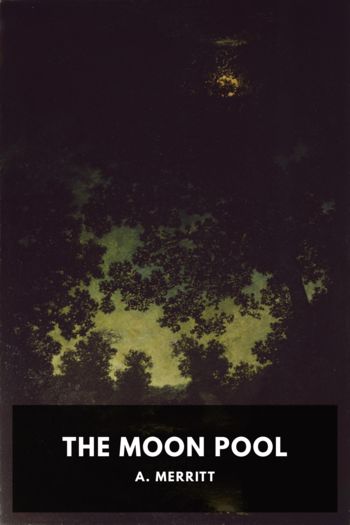Short Fiction - H. P. Lovecraft (i can read book club .TXT) 📗

- Author: H. P. Lovecraft
Book online «Short Fiction - H. P. Lovecraft (i can read book club .TXT) 📗». Author H. P. Lovecraft
And now Atal, slipping dizzily up over inconceivable steeps, heard in the dark a loathsome laughing, mixed with such a cry as no man else ever heard save in the Phlegethon of unrelatable nightmares; a cry wherein reverberated the horror and anguish of a haunted lifetime packed into one atrocious moment:
“The Other gods! The Other gods! The gods of the outer hells that guard the feeble gods of earth. … Look away. … Go back. … Do not see! Do not see! The vengeance of the infinite abysses. … That cursed, that damnable pit. … Merciful gods of earth, I am falling into the sky!”
And as Atal shut his eyes and stopped his eyes and stopped his ears and tried to jump downward against the frightful pull from unknown heights, there resounded on Hatheg-Kla that terrible peal of thunder which awaked the good cotters of the plains and the honest burgesses of Hatheg, Nir and Ulthar, and caused them to behold through the clouds that strange eclipse of the moon that no book ever predicted. And when the moon came out at last Atal was safe on the lower snows of the mountain without sight of earth’s gods, or of the Other gods.
Now it is told in the mouldy Pnakotic Manuscripts that Sansu found naught but wordless ice and rock when he did climb Hatheg-Kla in the youth of the world. Yet when the men of Ulthar and Nir and Hatheg crushed their fears and scaled that haunted steep by day in search of Barzai the Wise, they found graven in the naked stone of the summit a curious and Cyclopean symbol fifty cubits wide, as if the rock had been riven by some titanic chisel. And the symbol was like to one that learned men have discerned in those frightful parts of the Pnakotic Manuscripts which were too ancient to be read. This they found.
Barzai the Wise they never found, nor could the holy priest Atal ever be persuaded to pray for his soul’s repose. Moreover, to this day the people of Ulthar and Nir and Hatheg fear eclipses, and pray by night when pale vapours hide the mountain-top and the moon. And above the mists on Hatheg-Kla, earth’s gods sometimes dance reminiscently; for they know they are safe, and love to come from unknown Kadath in ships of cloud and play in the olden way, as they did when earth was new and men not given to the climbing of inaccessible places.
From BeyondHorrible beyond conception was the change which had taken place in my best friend, Crawford Tillinghast. I had not seen him since that day, two months and a half before, when he had told me toward what goal his physical and metaphysical researches were leading; when he had answered my awed and almost frightened remonstrances by driving me from his laboratory and his house in a burst of fanatical rage, I had known that he now remained mostly shut in the attic laboratory with that accursed electrical machine, eating little and excluding even the servants, but I had not thought that a brief period of ten weeks could so alter and disfigure any human creature. It is not pleasant to see a stout man suddenly grown thin, and it is even worse when the baggy skin becomes yellowed or greyed, the eyes sunken, circled, and uncannily glowing, the forehead veined and corrugated, and the hands tremulous and twitching. And if added to this there be a repellant unkemptness; a wild disorder of dress, a bushiness of dark hair white at the roots, and an unchecked growth of white beard on a face once clean-shaven, the cumulative effect is quite shocking. But such was the aspect of Crawford Tillinghast on the night his half coherent message brought me to his door after my weeks of exile; such was the spectre that trembled as it admitted me, candle in hand, and glanced furtively over its shoulder as if fearful of unseen things in the ancient, lonely house set back from Benevolent Street.
That Crawford Tillinghast should ever have studied science and philosophy was a mistake. These things should be left to the frigid and impersonal investigator for they offer two equally tragic alternatives to the man of feeling and action; despair, if he fail in his quest, and terrors unutterable and unimaginable if he succeed. Tillinghast had once been the prey of failure, solitary and melancholy; but now I knew, with nauseating fears of my own, that he was the prey of success. I had indeed warned him ten weeks before, when he burst forth with his tale of what he felt himself about to discover. He had been flushed and excited then, talking in a high and unnatural, though always pedantic, voice.
“What do we know,” he had said, “of the world and the universe about us? Our means of receiving impressions are absurdly few, and our notions of surrounding objects infinitely narrow. We see things only as we are constructed to see them, and can gain no idea of their absolute nature. With five feeble senses we pretend to comprehend the boundlessly complex cosmos, yet other beings with a wider, stronger, or different range of senses might not only see very differently the things we see, but might see and study whole worlds of matter, energy, and life which lie close at hand yet can never be detected with the senses we have. I have always believed that such strange, inaccessible worlds exist at our very elbows, and now I believe I have found a way to break down the barriers. I am not joking. Within twenty-four hours that machine near the table will generate waves acting on unrecognized sense-organs





Comments (0)